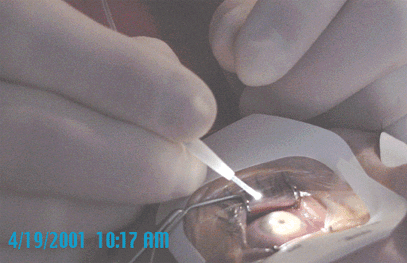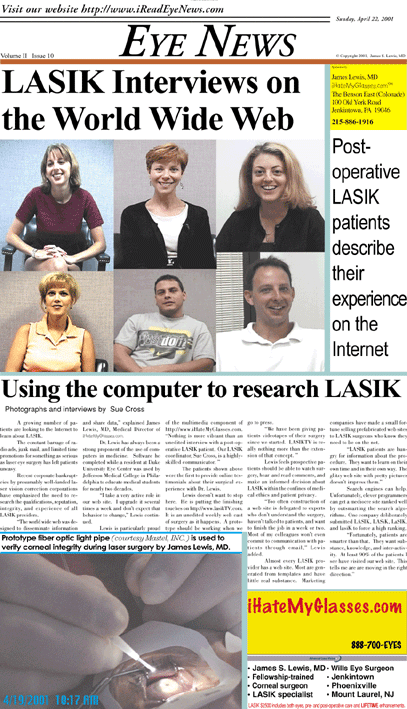Philadelphia / Bucks County LASIK Surgeon – Dr. James S. Lewis
Eye News Volume II Issue 10

LASIK Interviews on the World Wide Web

Photographs and interviews by Sue Cross
Using the computer to research LASIK
A growing number of patients are looking to the Internet to learn about LASIK.
The constant barrage of radio ads, junk mail, and limited time promotions for something as serious as laser eye surgery has left patients uneasy.
Recent corporate bankruptcies by presumably well-funded laser vision correction corporations have emphasized the need to research the qualifications, reputation, integrity, and experience of all LASIK providers.
“The world wide web was designed to disseminate information and share data,” explained James Lewis, MD, Medical Director of iHateMyGlasses.com.
Dr. Lewis has always been a strong proponent of the use of computers in medicine. Software he completed while a resident at Duke University Eye Center was used by Jefferson Medical College in Philadelphia to educate medical students for nearly two decades.
“I take a very active role in our web site. I upgrade it several times a week and don’t expect that behavior to change,” Lewis continued.
Lewis is particularly proud of the multimedia component of http://www.iHateMyGlasses.com. “Nothing is more vibrant than an unedited interview with a post-operative LASIK patient. Our LASIK coordinator, Sue Cross, is a highly-skilled communicator. ”
The patients shown above were the first to provide online testimonials about their surgical experience with Dr. Lewis.
Lewis doesn’t want to stop here. He is putting the finishing touches on http://www.lasikTV.com. It is an unedited weekly web cast of surgery as it happens. A prototype should be working when we go to press.
“We have been giving patients videotapes of their surgery since we started. LASIKTV is really nothing more than the extension of that concept. ”
Lewis feels prospective patients should be able to watch surgery, hear and read comments, and make an informed decision about LASIK within the confines of medical ethics and patient privacy.
“Too often construction of a web site is delegated to experts who don’t understand the surgery, haven’t talked to patients, and want to finish the job in a week or two. Most of my colleagues won’t even commit to communication with patients through email,” Lewis added.
Almost every LASIK provider has a web site. Most are generated from templates and have little real substance. Marketing companies have made a small fortune selling prefabricated web sites to LASIK surgeons who know they need to be on the net.
“LASIK patients are hungry for information about the procedure. They want to learn on their own time and in their own way. The glitzy web site with pretty pictures doesn’t impress them.”
Search engines can help. Unfortunately, clever programmers can get a mediocre site ranked well by outsmarting the search algorithms. One company deliberately submitted LASIK, LASiK, LaSIK, and lasiK to force a high ranking.
“Fortunately, patients are smarter than that. They want substance, knowledge, and inter-activity. At least 90% of the patients I see have visited our web site. This tells me are are moving in the right direction.”
The constant barrage of radio ads, junk mail, and limited time promotions for something as serious as laser eye surgery has left patients uneasy.
Recent corporate bankruptcies by presumably well-funded laser vision correction corporations have emphasized the need to research the qualifications, reputation, integrity, and experience of all LASIK providers.
“The world wide web was designed to disseminate information and share data,” explained James Lewis, MD, Medical Director of iHateMyGlasses.com.
Dr. Lewis has always been a strong proponent of the use of computers in medicine. Software he completed while a resident at Duke University Eye Center was used by Jefferson Medical College in Philadelphia to educate medical students for nearly two decades.
“I take a very active role in our web site. I upgrade it several times a week and don’t expect that behavior to change,” Lewis continued.
Lewis is particularly proud of the multimedia component of http://www.iHateMyGlasses.com. “Nothing is more vibrant than an unedited interview with a post-operative LASIK patient. Our LASIK coordinator, Sue Cross, is a highly-skilled communicator. ”
The patients shown above were the first to provide online testimonials about their surgical experience with Dr. Lewis.
Lewis doesn’t want to stop here. He is putting the finishing touches on http://www.lasikTV.com. It is an unedited weekly web cast of surgery as it happens. A prototype should be working when we go to press.
“We have been giving patients videotapes of their surgery since we started. LASIKTV is really nothing more than the extension of that concept. ”
Lewis feels prospective patients should be able to watch surgery, hear and read comments, and make an informed decision about LASIK within the confines of medical ethics and patient privacy.
“Too often construction of a web site is delegated to experts who don’t understand the surgery, haven’t talked to patients, and want to finish the job in a week or two. Most of my colleagues won’t even commit to communication with patients through email,” Lewis added.
Almost every LASIK provider has a web site. Most are generated from templates and have little real substance. Marketing companies have made a small fortune selling prefabricated web sites to LASIK surgeons who know they need to be on the net.
“LASIK patients are hungry for information about the procedure. They want to learn on their own time and in their own way. The glitzy web site with pretty pictures doesn’t impress them.”
Search engines can help. Unfortunately, clever programmers can get a mediocre site ranked well by outsmarting the search algorithms. One company deliberately submitted LASIK, LASiK, LaSIK, and lasiK to force a high ranking.
“Fortunately, patients are smarter than that. They want substance, knowledge, and inter-activity. At least 90% of the patients I see have visited our web site. This tells me are are moving in the right direction.”

Prototype fiber optic light pipe (courtesy Mastel, INC.) is used to verify corneal integrity during laser surgery by James Lewis, MD.

Dr. Lewis is proud of his reputation as a leading LASIK eye surgery Philadelphia expert. In addition, he is renowned as a foremost Epi-LASIK Philadelphia, Bucks County and Elkins Park surgeon. Other procedures Dr. Lewis performs more of include implantation of intraocular lens implants and collamer intraocular lenses, such as Visian ICL in Philadelphia.